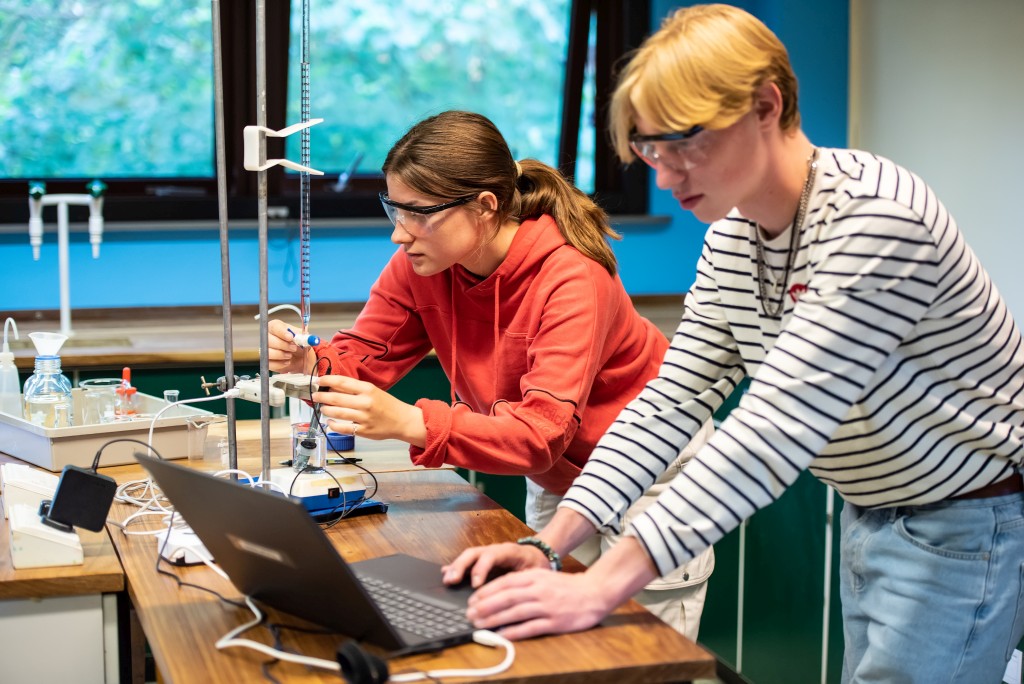 Pearson AAQ Level 3 Extended Cert. (Single)
Pearson AAQ Level 3 Extended Cert. (Single)
Why study Applied Science?
The Pearson Level 3 Alternative Academic Qualification BTEC National in Applied Science (Extended Certificate) is designed for students with an interest in science and who aim to progress to higher education as a route to graduate level employment. Equivalent to one A level, it is suitable for students looking to develop their applied knowledge and skills in science alongside two A levels or BTECs.
It is designed to offer an option for students who enjoy science in its entirety and don’t want to narrow their options. It is a great course to take as a route into more vocational Science careers from Paramedic Science, Nursing or Midwifery to Applied Sport and Exercise Sciences.
What will I study?
This course covers a wide variety of different scientific topics in Biology, Chemistry and Physics, building on what you have learnt at GCSE, as well as a large emphasis on practical and investigative work in many areas of science, enabling you to develop significant practical skills.
How will I study?
The course lends itself to practical investigations, independent research, and more traditional class based activities, which will all contribute to you developing a clear understanding of how science in the classroom can be applied in the wider world.
How will my work be assessed?
There are 5 units that make up this BTEC qualification. The available grade range is P – D* (Pass, Merit, Distinction, Distinction*).
Units 1 to 3 cover key scientific theory taken from the A level specifications of Biology, Chemistry and Physics. External exams on each of these is worth 16.7% of the qualification and are taken throughout the course.
- Unit 1: Principles and Applications of Biology – Structure and function of cells and tissues, biological molecules, enzymes and their role in organisms.
- Unit 2: Principles and Applications of Chemistry – Structure of the Periodic Table and its implications on physical and chemical properties of substances, through analysis of different bonding methods.
- Unit 3: Principles and Applications of Physics – Waves and their applications; force principles and their application in transportation and construction of electrical circuits.
- Unit 4: Practical Scientific Procedures and Techniques – (Internally assessed through coursework, worth 25% of the qualification)
- This unit introduces you to standard laboratory equipment and techniques, including titration, colorimetry, chromatography, calibration procedures and laboratory safety.Through the practical tasks in the unit, you will develop proficiency in the quantitative analytical techniques of titration and colorimetry, including learning to calculate the concentration of solutions.
- You will use measurement of temperature to study cooling curves, be introduced to paper and thin-layer chromatography (TLC), techniques to investigate plant growth and designing circuits to investigate resistance and solar panels. You will also have the opportunity to calibrate equipment and will be encouraged to be aware of the safety aspects of given laboratory procedures and techniques.
- The experience you gain will be invaluable in scientific higher education where there is a requirement for you to follow written scientific procedures and a desire to ensure accuracy by utilising correct technical procedures. Additionally, calibration procedures may be beneficial for related health profession routes, where pipettes, balances, pH meters and thermometers may be appropriate to use.
- Unit 5: Scientific Investigation Skills – (Internally assessed through coursework, worth 25% of the qualification)
- In this unit you will carry out investigative research, including planning, data collection, analysis and evaluation.
- You will carry out an individual investigative project that you have chosen in collaboration with your teacher. You will carry out a scientific literature search and review, considering the project’s aims and objectives and formulating a suitable hypothesis that you can test by using practical work. You will then produce a realistic plan and submit it to your tutor for the first assessment and feedback.
- Once you have approval to continue, over the course of several weeks you will carry out the project safely using your scientific investigation skills, project management skills and what you have learnt from the other units.
- Finally, you will prepare an evaluative report that will consider the project outcomes and suggest amendments that may have improved those outcomes. Completing an investigative project is an excellent way for you to develop independent learning skills, primary and secondary research skills, along with communication and critical thinking skills to facilitate an understanding of the science-related workplace. Of considerable benefit for progression to higher education in a variety of science and science-related courses and to employment in the science or applied science sector.
What are the entry requirements?
5 Grade 4s at GCSE including English, Maths grade 5, Combined Science 5/5 or Triple science 5/5/5.
